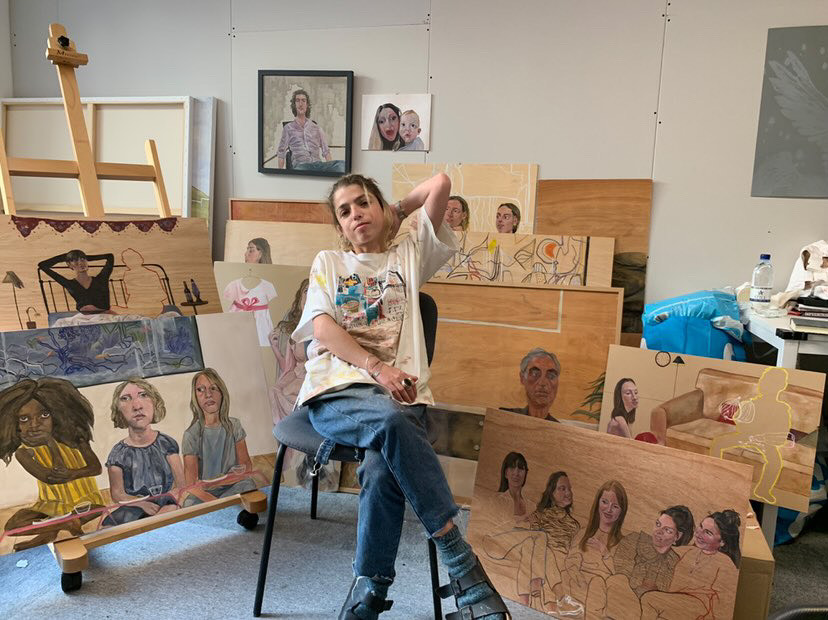
‘London’s streets are paved with gold’, or so the saying goes. For aspiring creative minds, how much truth does that tongue-in-cheek promise once made to Dick Whittington still hold?
We’re trying to find out. In this new series, illuminating the world of London’s emerging creatives and explaining how they got there, Lottie Leseberg Smith spends a day with Lorena Levi – a London based artist.
Would give zero stars if I could – it’s not a review of Lorena Levi’s debut solo show at The Alchemy Experiment, but rather its witty title, as the exhibition presents tripadvisor reviews turned into narrative paintings.
Lorena is, among other things, a figurative painter. Omegle surfer, Real Housewives of Beverly Hills enthusiast, recent graduate and friend of mine are all also applicable, as is bright young thing trying to make it big in the British capital.
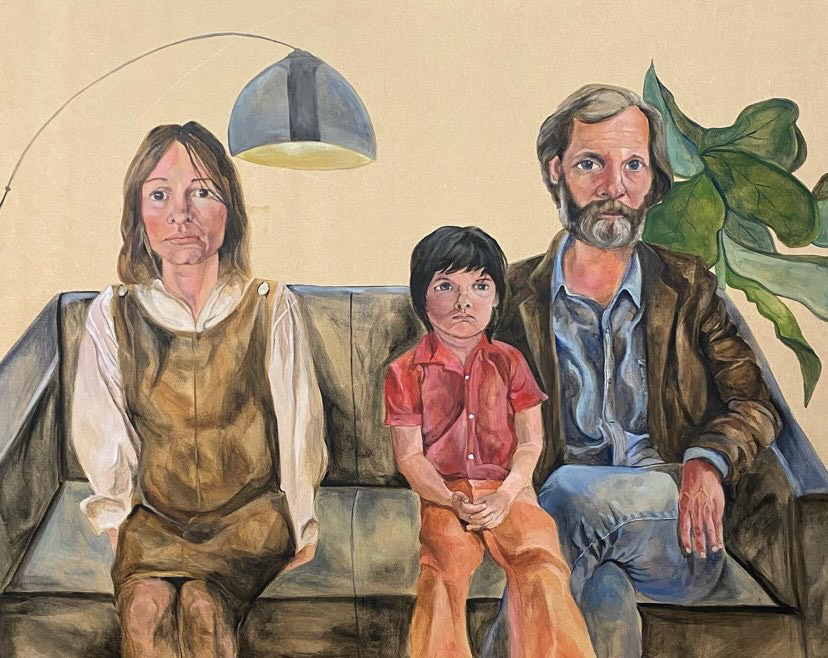
With battle cries of billionaires fixated on their daily routine and ‘that girl’ followers waking up at 5am, we are overstimulated to the extreme with the idea of faux ‘productivity’ and hustle culture punctuated by a “💯” emoji. No industry is exempt, and the ‘hustle never stops’ mentality certainly pervades the creative industry (an insight we received from Oscar Ryan in his interview).
This is in harsh contrast to the common cultural narrative that surrounds ‘the artist’, a label that comes with stereotypes of an ephemeral, elusive character, often riddled with mental health problems and decidedly whimsical, a world away from the rise and grind mentality. What do their days look like? Are they dreaming in fields, reading upside down, or partaking in other kooky activities? No, they get up and go to work just like everyone else.
I sat down with Lorena at her V.O Curations studio in Angel, where she talked about just what it’s like being a young artist in London.
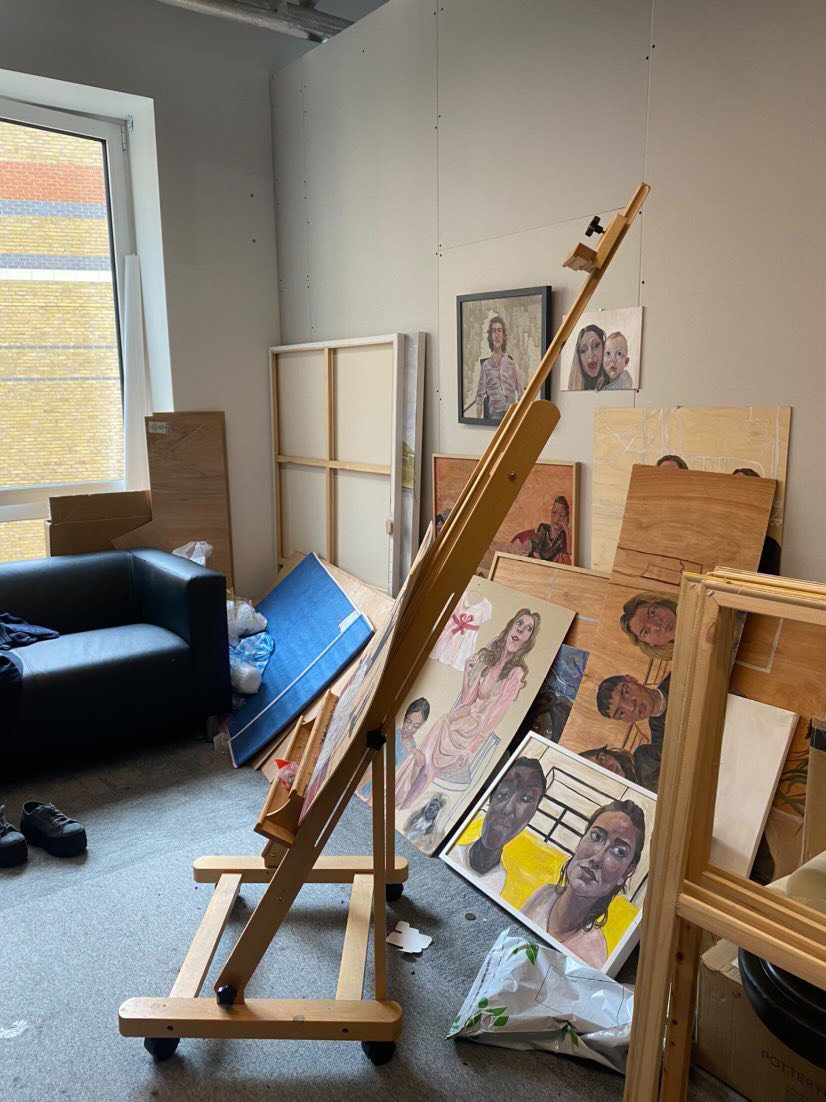
All around us are floating figures on wood panels, faces half-recognisable, faint pencil lines turning into thick paint the colour of human flesh. There are friends we know, people neither of us have ever met, and, of course, the empty spaces which are reserved for people we would rather forget.
“I love leaving space,” Lorena explains. “There is an uncertainty with perspective of where the people I paint are in a room. Sometimes I feel like they are floating in a familiar unfamiliar space – I love emptiness because that’s for the viewer to figure out.”
I ask about the figures and Lorena tells me, “I find painting other things really boring. Honestly. When I did art foundation, I just did what I was told, and at school, I just made things that would get me into Uni with a good portfolio. I was looking at objects and bodies then I guess, but it wasn’t anything to do with storytelling, it was all about form and nudity.”
Lorena is a storyteller, looking around at her own unique moment in time.
Whether its telling the tale of what it’s like to go on a terrible hinge date with a boy who uses T.S.Eliot poetry books for a nightstand, or finding ‘characters’ on Omegle, she captures the funny side of what it’s like to grow into herself in this city.
So when did the narrative start?
“When I was at university in Edinburgh, I found the first semester really hard. I just didn’t know what to do, as it was the first time I got to do something self-directed. So, I just did portraits of all my friends taken from photographs they sent me when they were on the toilet. In my paintings you can only see their faces. The humorous side of my work definitely started here, but also the idea of the ‘lack’ of something, in removing the toilets, searching for that empty space.
“After that I was in hospital for a little while, and I started to do more narrative, but I focused on myself, which I had never done before. I found it really uncomfortable, especially at a really difficult time. It was very exposing, but it taught me to create a story in just one frame.
“I love people’s faces and their body language, the sitter’s internal world and their relationship with others is infinitely intriguing. It’s a look at psychology rather than sitting down to do a static portrait in a traditional sense.”
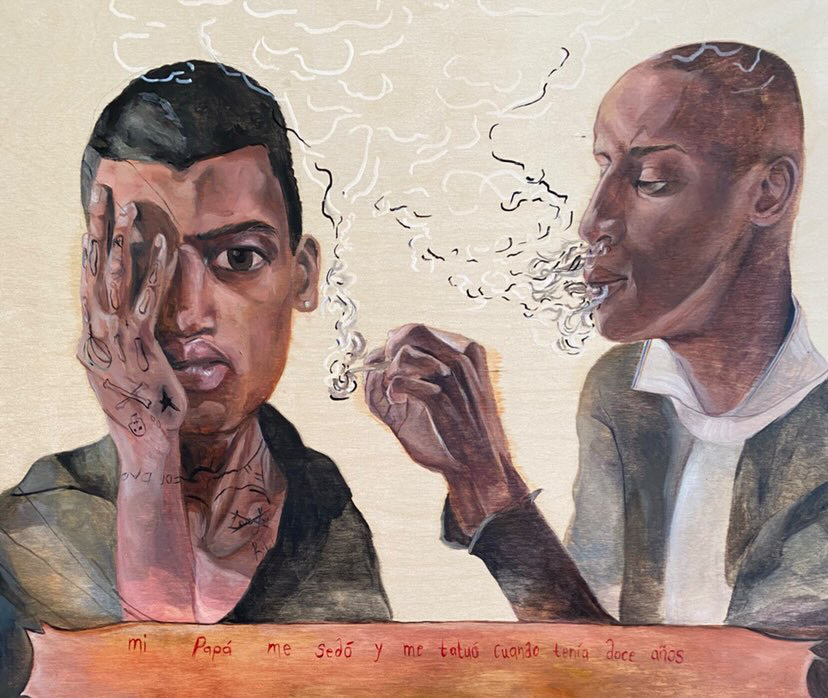
“Walk me through it,” I demand. “A day in the life.”
“I see the studio as coming in for work, it’s very self-directed. I spend the whole day here and I’ll leave here when I’m happy, which really could be any time. If I have run out of materials, I’ll go to a builders merchant and get a woodcut.”
A builders merchant? We giggle. Lorena is a human interpretation of a hummingbird and an image that seems in contrast to the usual customers in a builders merchant.
“They were surprised to see me at first as they are usually used for building needs, but I went to the same one and now they know who I am, I’m Lumberjack Lorena.
“And then I put on some mind numbing reality TV or an audiobook if I’m feeling especially smart. No other show competes with Real Housewives of Beverly Hills. Elements of certain characters of what I watch sometimes seep into the painting, it’s very rare but a characteristic of an actor might seep in.”
“Even Kyle Richards from Real Housewives of Beverly Hills?”
“No,” Lorena responds. ‘Those women are too incredibly intricate to paint.’
So the day of an artist sounds relatively simple right? Fun even. But then you think about what being an artist entails. And as I speak to Lorena more, making the artwork is but one element in a sea of hundreds. To be an artist is to be CEO of a company, running your own business, becoming a social media manager, PR team, sales, administration and of course, creating the art.
Wishing upon a star and waiting around for luck is terrible career advice. So is ‘just get through it’. Just being good or talented is not a great starting point, especially if you believe that either of those things can be cultivated rather than just born identities. So let’s get into it – here are Lorena’s key takeaways:
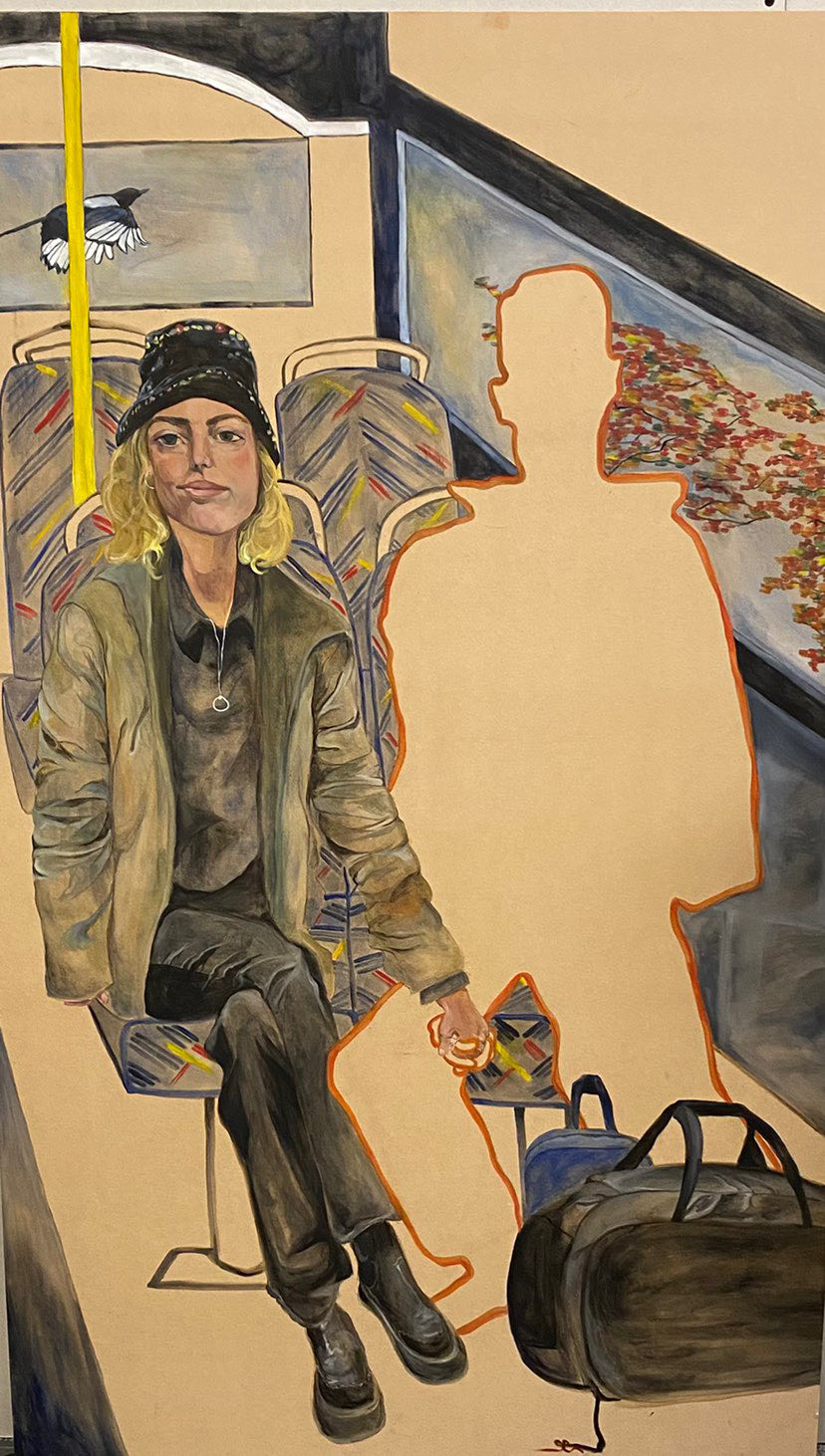
Money makes the world go round
The facts are the facts; money talks in every career. It’s Lorena’s reason as to why she believed she could be an artist, and why she is able to continue to do what she loves. She wouldn’t be an artist if she didn’t get paid – it always had to be a viable and profitable career.
“I didn’t consider being an artist as something I actually wanted to try and make into a career at university. I honestly didn’t think my work would sell. I didn’t think it would be marketable. It was only after the grad show where I started to get positive feedback, and a couple places wanted to represent my work that I actually started considering it seriously. My art was never something I thought I could make a living out of until my work started to sell.
“I wouldn’t keep going if I couldn’t sustain myself, that’s such an important part of it. To rent your own space, and the time to be able to work and paint comes with money. If I had another job, if I wasn’t selling my artworks, I wouldn’t have the time to create as much as I do.”
“I had no idea how much of a business it would be. It’s been okay so far, but learning how to sell myself has been incredibly hard.”
As Lorena explained earlier, she gets into the studio in the morning and works all day. Consistency is clearly key, being on top of admin basic but essential, and the ability to be regimented, which funnily enough, is a sure way to give yourself freedom. Lorena also cites social media as one of the most important career pushers for an artist. Posting and promoting yourself in today’s world is difficult, and Lorena – and pretty much all of us – are still out here trying to figure that part out.
Apply apply apply
Short and sweet: Just do it. Just apply. Directly reach out to galleries, open calls, prizes, competitions.
View this post on Instagram
The Infamous Luck
Often creatives pin elements of their success down to luck. But what does this elusive state actually create, and how do you grab it and make it yours?
“A lot of things happened when I first started out that I didn’t expect, such as galleries approaching me, or winning The Jackson Art Prize. Of course I worked hard to get there, but I think there was an element of luck there. Either way, it gave me so many more opportunities, and the opportunity to do solo shows.”
Maybe you are only lucky in hindsight, and in the moment, at the time, it was just hard work.
Fail, fail and fail again
Immediately, you have to be comfortable with the fact you will fail far more than you will succeed.
“I’ve had so many rejections. So many and so fast. The first part of a career in art is just failing, and having to be ok with it. It’s just the way it works. After you fail, how are you going to figure out how to keep doing what you love to do? How are you going to keep going?
“Not everyone is going to like your work and that’s ok, because some people are going to really like it. You have to keep going to find them. When I ‘fail’, I just immediately look for the next thing. Ok that didn’t work, what can I apply for next, can I sell this work to someone else?”
Focus on yourself
“I get overwhelmed when I think about the future, where my work is going and if I even like my work. I get very critical. I compare myself a lot. I always ask myself – am I doing enough? People in this industry work so hard. There is definitely a misconception around being an artist – people think, ‘Oh so you’re an artist, you must do nothing. Nice.’
‘There is so much that goes into it, the practice, the promotion, the network, you are running yourself as a business, but there is always this idea of could I be doing more, am I doing enough for myself? I try to block out what I think I should be doing and focus more on what I have already done and what I have coming up soon.’”
“Your whole job is about you, you are not working for anyone else.”
Building your network
Growing your client base is essential. These are not only the people that will buy your artwork, but sometimes provide other valuable services, like advice.
“Being in this studio space is amazing, I learn so much from other artists, how they are navigating this career. Everyone is really sweet and promotes each other. Being an artist is lonely but being with other people in the studio encourages you to keep going.”
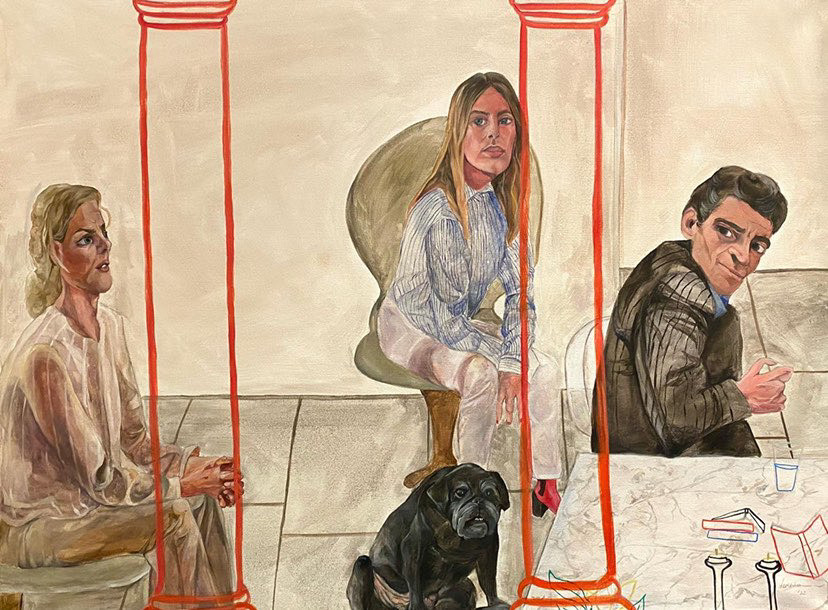
I walk through the corridors on my way out, looking into the other studios that are housed in this converted old office space. In the space of a PC and monitor, the old cubicles are now filled with statues, fabrics, sculptures, cuttings and paints. It makes me smile, it looks a little bit like the artists are rewilding the grey drab city.
I’m in the ex-corporate stainless steel lift and into the lobby and maybe it’s hyped up by the surroundings, but it really strikes me as the biggest lesson of all Lorena taught me: treating yourself like a business and being regimented in your creativity is actually is what unlocks the freedom of being able to do what you love most.
Thinking about it more, these artists working away in this old office building turned studio, is not so much a contrasting image. Infact, it’s entirely appropriate. They are business people after all.


